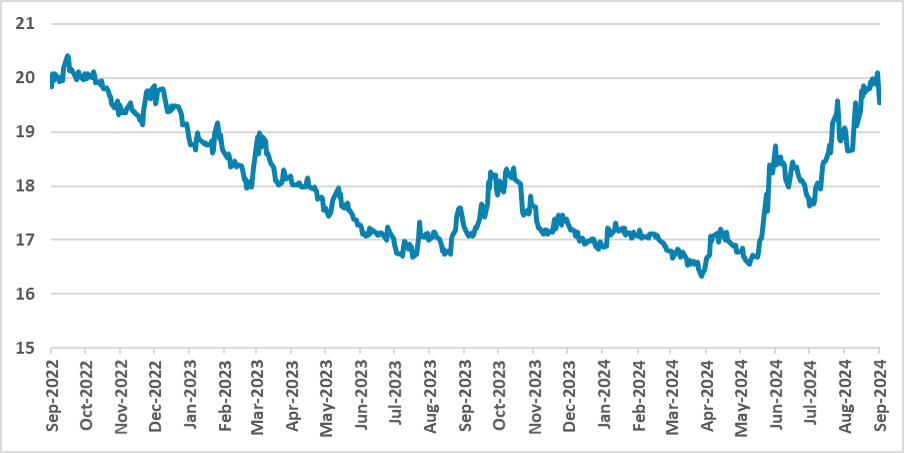Mexico: Controversial Judicial Reform is Approved by the Congress
The Mexican Senate approved a controversial judicial reform proposed by President López Obrador's MORENA party. The reform calls for the election of all 7,000 federal judges, with current judges being dismissed. Supreme Court justices will also be reduced and replaced by elections in 2025. Concerns have been raised about MORENA potentially dominating the judiciary, and the reform’s impact on democratic institutions remains uncertain. Market reactions have been limited, with external factors driving Mexico’s currency weakness.
Figure 1: MXN/USD

Source: Refinitiv
The Senate has approved the controversial judicial reform sent to Congress in February by incumbent President López Obrador from MORENA. At that time, MORENA did not hold the qualified majority of 2/3 in both legislative houses needed to approve constitutional amendments, and the likelihood of approval was minimal. However, after the general elections in June, the MORENA coalition was able to gather the qualified majority in Congress and fell short of one seat to achieve it in the Senate, needing to flip only one opposition vote to approve constitutional amendments.
The new Congress assumed office on September 1 and began advancing the judicial bill, which is now approved and only requires 2/3 of the state legislatures to pass. It is expected to achieve this soon.
The reform proposes that all 7,000 judges of the federal judicial system will be elected by popular vote. The judges currently in office will be dismissed. Members of the Judicial, Executive, and Legislative branches will create a list, which will then be filtered by Congress, and the shortlisted names will appear on the ballots. The term for the judges would be 9 years, and they could be re-elected. The local judicial system would not be affected.
In the Supreme Court, the number of judges would be reduced from 11 to 9. All current Supreme Court members would be replaced in an election set for 2025. The elected judges will have terms of 14, 12, or 8 years, depending on the number of votes they receive. Once their terms end, new elections will be held. The power of the Supreme Court would also be limited, as they could only review sentences.
This reform is unprecedented. The U.S. holds local judicial elections, while Bolivia holds elections for some members of the judicial system. This reform would overhaul the entire federal system of judges and impose elections for all of them.
Concerns over the quality of the institution have arisen with this reform. Due to MORENA's high popularity, they will likely be able to elect a significant number of judges and could control the Supreme Court. It remains to be seen whether MORENA will use the judiciary to undermine Mexico’s democratic institutions and impose its views, weakening the opposition, as happened in Venezuela, or whether they will respect institutional boundaries.
At the moment, market reactions have been limited. The reality is that there is still a great deal of uncertainty about the true impacts of the judicial reform, and we believe the general weakness of the MXN is more related to external factors than internal ones, although this could dampen FDI prospects. However, in the short term, the outcome of the U.S. elections may be more significant, as a possible Trump victory could jeopardize Mexico-U.S. relations.